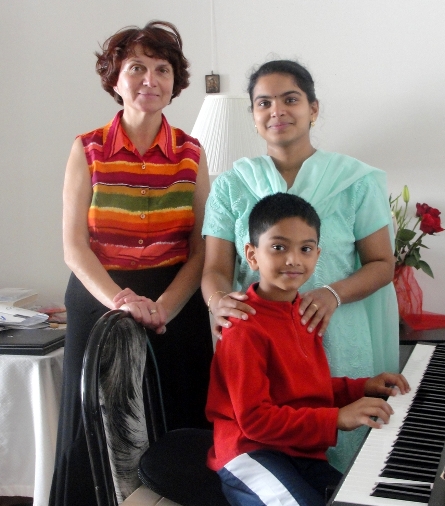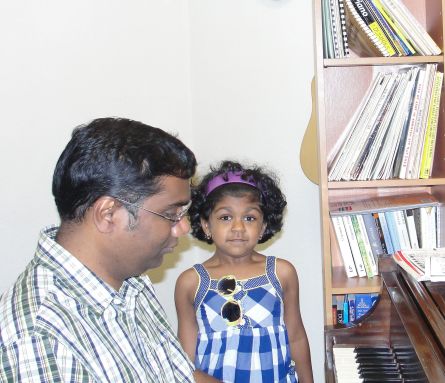You Want Your Child to Study Music
Dear Parents,
We are at www.trio-school.com, [email protected], 408-628-9272, and we do want you to read all the information on the website.
Our address: 121 W Washington Ave Ste 206 and 208. Sunnyvale (intersection of Murphy and W Washington, in front of Macy’s, in the same building with “Posdale” restaurant or “ American Italian bistro”, and a hair salon)
YOU WANT YOUR CHILD TO STUDY MUSIC
Many of you have accepted my friend requests, and now we can discuss very openly the “pros” and “cons” of music education. I need to warn you that, while a great majority of parents have a strong desire to expose their children to music, too often they look for teachers (usually private teachers who would come to their homes) who will “just” bring some “fun” to their kids’ lives. But some of you ask if the teacher can prepare the students for certificate of merit exams.
There are several important moments I need to tell you about.
1) Music is not easy to learn, and the main difficulty is the need to practice at home. There is no other activity but art which supposes home practice, which is the least desirable by the students activity.
2) There are many levels of exposure to music. Some parents think that “pressure- less” study of their children is what they really need. They tell frankly that they do NOT want their children to become musicians; that’s why they expect those to “just have fun”. There are lots of music teachers who will only provide the lowest level, low pace education. Usually they stick to one method book and let the students feel proud moving from level A to level B, and so on. Such teachers use Alfred’s method books, which suppose the use of the most primitive self-made melodies (not adaptations of popular classics or well-known folk songs) with absolutely ungrammatically written lyrics of those self-made songs. Why the teachers use those books is: They are easy, not challenging, and the students do not have to stretch up learning. They, students, even get an idea that the same fingers will be used for the same keys forever, which is totally wrong. As a result of teaching based on Alfred’s method, the teachers can keep happy, relaxed students in their studios.

3) There is another method, which offers more professional approach and more professionally composed or adapted pieces of music. It’s Farber and Farber’s method. The pieces in those books are more impressive; still, the hand positions and the same fingers are used, which is not good. Plus, the beginner students do not learn the harmonies for too long and are confined to believing that what they play is real music, but they mostly play Only Melodies for too long.
At our school, we teach differently. Frist of all, we are the only school that admits three-year-olds in the piano class. Sometimes they are even younger. This class is for a parent and a child, and the rich cooperation between the parents and the instructor develops. One of our teachers, Larysa Yost, besides her bachelor’s in piano, has earned a certificate in early childhood education in order to approach the youngest students, whose main activity should be PLAY. She teaches familiar to them from preschool folk songs, which they play with both hands. They don’t only play the melodies but also accompaniment. Gradually, Larysa moves them to reading the notation of adopted classical pieces. We have a rich library, and you can borrow our books instead of purchasing Alfred’s or Farber and Farber’s books. We use a great variety of methods and method books and always look for most expressive pieces. The students sing ( solfege and also sing the lyrics) a lot during their piano lessons.
The role of a parent, who participates is such lessons actively and from time to time plays for 10-15 minutes during a 45-minute lesson in order to become a good couch, is honorable. It is the preparation for helping the child to practice at home. Those parents who do a very good job at home, have an opportunity to get more time for themselves during piano lessons. This way, they can learn more challenging pieces and perform them during our recitals. Our fondness of teaching harmonies from day one brings great opportunities to utilize the knowledge our students get at our school during the activities they’ll perform outside of school, playing accompaniment to the new songs.
4) As it was stated above, we are for teacher-parent cooperation, and we are blessed to have the parents who want to also learn and to be of the best help to their children. We do acknowledge that there is really a lot of work which can be done by inspired parents. They need to pass their belief and inspiration to their little ones, to have the tolerance and a lot of love of their children to lead them to practicing at home consciously, to explaining to them that there are lots of responsibilities in life, and only those, who prepare themselves for overcoming, can succeed. In general, there is REALLY a lot a loving parent can help a child in. This is why we risk to require the SOULFUL participation of parents in their children’s study. The more you learn yourself, the better your child will learn!
 5) Most of you ask if we give our lessons in our students’ home. We do not. We have great classrooms, and there are two grand pianos in piano room-one for a student and another for a teacher. We use handbells, drums, rhythm sticks, shakers and so on to keep our youngest students interested and to develop in them a feeling of PLAYING and learning through educational play. We do not come to your home because we do not want to feel GUESTS, not teachers, who’ve prepared a classroom for your child. Also, the children respect the education better when they, together with their parents, need to come to a different than their home place ( SCHOOL!), to enjoy the difference, and to be up to the expectations of the teacher. Those who learn music, learn how to stay focused, how to be constantly challenged, how to respect the composers, whose lives have always been extremely challenging, and who have left their masterpieces to us. It’s NOT easy to demonstrate everything we need in the environment of you house, where you most of the time are unable to offer a noise-free room for lessons. And some of you don’t have real instruments and prefer to use keyboards, which we consider to be only good for a couple of beginning weeks and which have to be replaced at least by 88-weighted-key digital pianos. We lend our keyboards to new students free of charge if they are aware that in three weeks they’ll have to get a real instrument.
5) Most of you ask if we give our lessons in our students’ home. We do not. We have great classrooms, and there are two grand pianos in piano room-one for a student and another for a teacher. We use handbells, drums, rhythm sticks, shakers and so on to keep our youngest students interested and to develop in them a feeling of PLAYING and learning through educational play. We do not come to your home because we do not want to feel GUESTS, not teachers, who’ve prepared a classroom for your child. Also, the children respect the education better when they, together with their parents, need to come to a different than their home place ( SCHOOL!), to enjoy the difference, and to be up to the expectations of the teacher. Those who learn music, learn how to stay focused, how to be constantly challenged, how to respect the composers, whose lives have always been extremely challenging, and who have left their masterpieces to us. It’s NOT easy to demonstrate everything we need in the environment of you house, where you most of the time are unable to offer a noise-free room for lessons. And some of you don’t have real instruments and prefer to use keyboards, which we consider to be only good for a couple of beginning weeks and which have to be replaced at least by 88-weighted-key digital pianos. We lend our keyboards to new students free of charge if they are aware that in three weeks they’ll have to get a real instrument.
6) In terms of exams for a certificate of merit, we need to warn you that, although we, the teachers of Trio School, are full members of Music Teachers’ Association of California and can help our students prepare for the exams and pass them, you will need to choose the intensity and the pace of your child’s learning. Those exams are extremely serious, based on learning not only beautiful pieces but also scales, etudes ( it’s a lot of technical work and lots of practice hours done for several years), doing a lot of ear training, learning the music theory of a college level, and so on. Those who want to “just have fun,” are not capable of passing those exams. Actually, since the greatest majority of students do want to have the limited exposure to music, parents need to explore this area and to consciously make a plan of the activities they do want their children to exercise for years. We, teachers, are READY to pass on our passion for music and instill the Love of music and respect of composers in your children. Still, most of them will not want to do the exam preparation but rather prefer to learn entertaining pieces, which will also be challenging to a degree. We, teachers, want to feel members of your extended families, who have a right to give an advice and to expect your following the plan we make together.
7) Because we are open to having your child study at a comfortable for him/her pace with or without performing on stage ( we have four recitals every year, and there is no school with such the density of stage presence), we have several categories of students: the students who will participate in certificate of merit exams; the students who want to be Just Exposed to music but still want to perform at the recitals; the students who learn totally for their own pleasure, choose their own pace, and may decide to perform when they feel ready.
As you can see, we treat our work seriously. But we are ready to hear your advice or concerns.
Indian parents, who bring their children to Trio School, are absolutely amazing. They all are software engineers with extremely busy work schedules, but they always find the time to help their children get the best education. This three-year-old boy and his Mom participate in “Mom and Me” 45-min piano lessons and learn together. The Mom gets 10-15 minutes of a lesson time, and she is much ahead of her son.
In the video you can see how she accompanies the little boy, who sings confidently and expressively. This song is one of so called “fake songs”, in which piano payers do not have to read the left hand part, which lets them play harmony without learning the base clef notation. But this lady has already learned the sonatina in A minor by Clementi, and she’s good not only at playing but also at couching her son at home. You can also see her dance at our recital, and we are very grateful to this Mom for her soulful attitude to our school.
https://www.youtube.com/watch?v=mZDcOpP6QDw
Prabha. Indian dance
https://www.youtube.com/watch?v=Dc0ZzhZCMww
https://www.youtube.com/watch?v=fk5nPXajivI
A family participating in the lesson spontaneously:
https://www.youtube.com/watch?v=KM2mIynzZAI
https://www.youtube.com/watch?v=yPvU3anaeiY
https://www.youtube.com/watch?v=03oETCoqiBU
https://www.youtube.com/channel/UCe3KoDhpRhHjSeRXmkeL2mg/
https://www.youtube.com/watch?v=bKZjg2eEBto
https://www.youtube.com/watch?v=2IlGq3BcPgI
https://www.youtube.com/watch?v=lUTCjV7-znI
https://www.youtube.com/watch?v=fvTrUqgp-IY
https://www.youtube.com/watch?v=0s-WnlRbQOI
https://www.youtube.com/watch?v=fxMzEEkT-wE
Go Back



